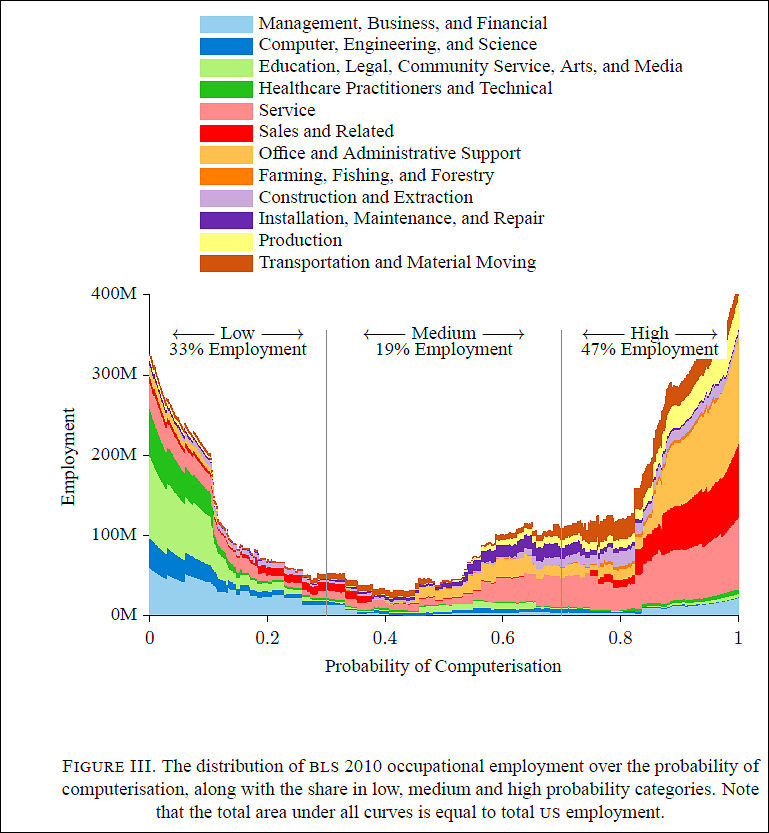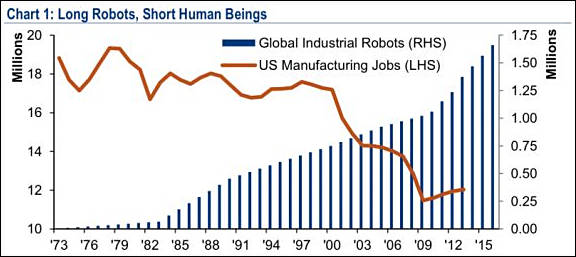
It allows to keep PV going, with more focus towards AI, but keeping be one of the few truly independent places.
-
Study found that jobs in transportation, logistics, as well as office and administrative support, are at “high risk” of automation. More surprisingly, occupations within the service industry are also highly susceptible, despite recent job growth in this sector.
Nearly half of US jobs could be susceptible to computerisation over the next two decades, study suggests.
“We identified several key bottlenecks currently preventing occupations being automated,” says Dr. Osborne. “As big data helps to overcome these obstacles, a great number of jobs will be put at risk.”

The study examined over 700 detailed occupation types, noting the types of tasks workers perform and the skills required. By weighting these factors, as well as the engineering obstacles currently preventing computerisation, the researchers assessed the degree to which these occupations may be automated in the coming decades.
“Our findings imply that as technology races ahead, low-skilled workers will move to tasks that are not susceptible to computerisation — i.e., tasks that required creative and social intelligence,” the paper states. “For workers to win the race, however, they will have to acquire creative and social skills.”
Dr Frey said the United Kingdom is expected to face a similar challenge to the US. “While our analysis was based on detailed datasets relating to US occupations, the implications are likely to extend to employment in the UK and other developed countries,” he said.

 us.jpg769 x 833 - 176K
us.jpg769 x 833 - 176K -
This is terrible. :(
Sometimes look like that the future of humanity will not be good.
-
Sometimes look like that the future of humanity will not be good.
And sometimes if you start to drink really, really hard you can even see some light far far ahead.
But it disappear as you go back from alcohol dreams.
-
I've been video editing for about 13 years. Things are going very well and I'm making investments that will guarantee a good future. Sure, things are shitty for a lot of people. But there are still a lot of people doing very well. I am very optimistic about the future, regardless of who will be the next president here in the US.
-
Is this mainstream media mind control disguised as "scientific data"? Very few people who are willing to make an effort to get training and new skills and adapt will be out of work permanently.
-
Is this mainstream media mind control disguised as "scientific data"? Very few people who are willing to make an effort to get training and new skills and adapt will be out of work permanently
It is scientific data that you do not like, obviously :-)
-
Im in two minds. Definitely some jobs will disappear with robots AI ect but this process is nothing new. Jobs have always been made obsolete through technology but then newer high IQ tasks often replace them. I agree we may already be in a situation where The West is really doing nothing, just consuming products and moving data around in some form or another. But I also believe in new jobs, even if robots take over a ton of people will need to maintain, design, sell, build robots....or at least the robots that make the robots. ;)
The other side is the reality is the West has stopped being the factory of the world and so bets are off on what the West looks like once this reality becomes more obvious. We already have a lot of long term unemployed as it is....
Plus isn't this the future that was dreamed about? A future of leisure and ease where task were done around us by robots? I mean as long as robots do all the work that frees us to do something we want. The question is how well and by what means will wealth and products created by automation be distributed in such a brave new world?
-
Jobs have always been made obsolete through technology but then newer high IQ tasks often replace them
It is not true :-) All the things described are accompanied by mass production and automatization. You do not need more high IQ jobs for this if you maintain same output, you need less. Illusion existed because of exponential growth.
A future of leisure and ease where task were done around us by robots?
May be it is the future some drug addicted idiot had in his mind :-)
-
Well, robots working for free is a great thing for humanity as a whole. It is just some generations inbetween that will suffer while the system changes.
-
It is scientific data that you do not like, obviously :-)
sorry, I don't have time to read the entire article. does it take into account that new technology will create new and different types of jobs?
-
May be it is the future some drug addicted idiot had in his mind :-)
I don't know who these guys are.... maybe junkies?
http://www.fastcompany.com/3046332/the-new-rules-of-work/what-work-will-look-like-in-2025
WHAT WORK WILL LOOK LIKE IN 2025
Anderson says some believe leaps in innovation will "flip the world from an era of scarcity to a time of abundance, predicting unlimited energy, food, clean water, and increasing human-life extension," she says. Machines could carry out tasks while programmed intelligence could act as our "digital agents" in the creation and sharing of products and knowledge. Hello, Jetsons.
Brynjolfsson also thinks that technology has the potential for "shared prosperity," giving us richer lives with more leisure time and freedom to do the types of work we like to do. But that’s going to require collaboration and a unified effort among developers, workers, governments, and other stakeholders.
-
I have so many conflicting thoughts about this movement. The findings seem generally credible.
Improvements in productivity have always been about doing more work with less human labor. At the early stages that sounds quite benign and beneficial to all. However, eventually, ever-increaing productivity means that humans will not be required for most of the work that gets done.
Some problems with this: Someone will own the robots and digital assistants performing all that work. Also, there is a real value for people to perform meaningful work that contributes value. For many people this contributes a sense of value and belonging.
-
I don't care what the geeks say, I ain't getting in no airplane flown by a fucking iPad and I don't want my kidney transplant done by Robby the fucking robot.
-
Essentially, in the future, it'll be more important to be cute and popular than smart.
-
@brianl "it'll be more important to be cute and popular than smart"... are you talking about robots or humans?
-
humans.
-
I'm pretty sure that the market value of "cute and popular" beat "smart" a while quite a ago.
-
I'm pretty sure that the market value of "cute and popular" beat "smart" a while quite a ago.
Unpopularity of smart is normal :-) As monkeys in overcrowded situation are always consumed almost entirely by building and rebuilding hierarchies, fights, sex and food (if they can get to it). Monkeys low in hierarchy want to at least behave (in our case - look and buy things) like top ones.
Advanced knowledge and ability to do new stuff is that separates humans from monkeys.
-
I'm pretty sure most women would take Brad Pitt over Bill Gates....your argument fails.
-
I'm pretty sure there's a lot more to life than being really, really, ridiculously good looking. And I plan on finding out what that is. -- Zoolander
-
I'm pretty sure most women would take Brad Pitt over Bill Gates....your argument fails.
You mean that woman originated from gods directly, instead of monkeys?
-
Seems to me that in the U.S., the work force has moved from once being agrarians to skilled industrialists and now finally to low-paying service-oriented workers. Lower cost manufacturing will increasingly be overseas and will stay that way as long as "free trade" allows it. Now, 93 million Americans aren't working (who wants a job that requires one to ask customers if they would "like fries with that)?? There are no short-term solutions in sight as politicians kowtow to special interests and seek ongoing favor from a dependent electorate by promising them crumbs that fall off the federal table. The pressure on the federal government to "take care" of this increasingly non-productive society will be huge and will bankrupt us sooner rather than later. (We already have $127 trillion in UNFUNDED LIABILITIES on the long-term books!!) There isn't enough money in circulation to begin to tackle that debt! We have gone from the land of the opportunistic free to the land of the enslaved and beholden. Sad, indeed.
Bob Dylan was apparently right...
"You're gonna have to serve somebody, yes indeed;
You're gonna have to serve somebody...
It may be the devil or it may be the Lord;
But you're gonna have to serve somebody.
-
Seems to me that in the U.S., the work force has moved from once being agrarians to skilled industrialists and now finally to low-paying service-oriented workers.
We have gone from the land of the opportunistic free to the land of the enslaved and beholden.
This is that energy almighty can do :-) Nothing to do with gods and devils.
-
Lower cost manufacturing will increasingly be overseas and will stay that way as long as "free trade" allows it.
After decades of exodus, companies returning production to the U.S. http://www.latimes.com/business/la-fi-returning-jobs-20140513-story.html#page=1
-
Propaganda always work :-) Just no need to show big picture :-)
U.S. factory payrolls have grown for four straight years, with gains totaling about 650,000 jobs. That's a small fraction of the 6 million lost in the previous decade, but it still marks the biggest and longest stretch of manufacturing increases in a quarter century.
If you do not account for population increase and how many adjustment good jobs had been lost, it can even look optimistic. Also no need to describe in article that sometimes transferred lots of jobs that had absolute no economics effects (except manager bonuses). Today it is also same, many of this companies got tax reductions for adding jobs (of course tax reductions are big :-) )
Howdy, Stranger!
It looks like you're new here. If you want to get involved, click one of these buttons!
Categories
- Topics List23,998
- Blog5,725
- General and News1,360
- Hacks and Patches1,153
- ↳ Top Settings33
- ↳ Beginners256
- ↳ Archives402
- ↳ Hacks News and Development56
- Cameras2,367
- ↳ Panasonic995
- ↳ Canon118
- ↳ Sony156
- ↳ Nikon96
- ↳ Pentax and Samsung70
- ↳ Olympus and Fujifilm101
- ↳ Compacts and Camcorders300
- ↳ Smartphones for video97
- ↳ Pro Video Cameras191
- ↳ BlackMagic and other raw cameras116
- Skill1,960
- ↳ Business and distribution66
- ↳ Preparation, scripts and legal38
- ↳ Art149
- ↳ Import, Convert, Exporting291
- ↳ Editors191
- ↳ Effects and stunts115
- ↳ Color grading197
- ↳ Sound and Music280
- ↳ Lighting96
- ↳ Software and storage tips266
- Gear5,420
- ↳ Filters, Adapters, Matte boxes344
- ↳ Lenses1,582
- ↳ Follow focus and gears93
- ↳ Sound499
- ↳ Lighting gear314
- ↳ Camera movement230
- ↳ Gimbals and copters302
- ↳ Rigs and related stuff273
- ↳ Power solutions83
- ↳ Monitors and viewfinders340
- ↳ Tripods and fluid heads139
- ↳ Storage286
- ↳ Computers and studio gear560
- ↳ VR and 3D248
- Showcase1,859
- Marketplace2,834
- Offtopic1,320








